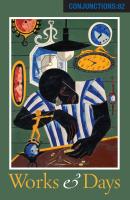![[A Reading by Jay Cantor]](http://www.conjunctions.com/images/event_image.php?id=128389) Introduced by Bradford Morrow, this event is free and open to the public; no tickets or reservations required.
Introduced by Bradford Morrow, this event is free and open to the public; no tickets or reservations required."These fluently empathic, mordantly ironic, and unflinching stories of love, dissent, torture, and sacrifice carry forward Kafka’s eviscerating vision and affirm Cantor’s standing as a virtuoso writer of conscience." —Booklist
“Forgiving the Angel links disparate time, places and characters in an ingeniously unified and admirably purposeful fiction. [In its] formal circularity, ethical ambiguity and scrupulous undecidability, Cantor’s fiction is a worthy homage to Kafka. It is also an original work that pulls our mind through the kind of biographical and historical contraption that Kafka would probably never have put together, would probably not, as a Jew in Czechoslovakia, have survived to put together.”—New York Times Book Review
“Four evocative, ambitious, and highly varied tales aim to bring Kafka back to us by showing that he never left. Instead, he haunts everyone and everything he touches … Cantor creates gripping stories around innumerable epistolary and biographical artifacts … Superb.” —Slate
“This fictional tribute to the life and work of Franz Kafka follows in the vein of Cantor’s previous works of fiction … all of which use familiar figures and true events as a springboard for offbeat and psychologically incisive storytelling. The four stories here center on real figures in Kafka’s life … The writer himself is a distant but powerful force in the stories, a Kafkaesque presence haunting his own legacy.” —New Yorker
JAY CANTOR is the author of three novels, The Death of Che Guevara, Krazy Kat, and Great Neck; and two books of essays, The Space Between and On Giving Birth to One’s Own Mother. He is the recipient of a 1989 MacArthur Fellowship, or "Genius Grant."
